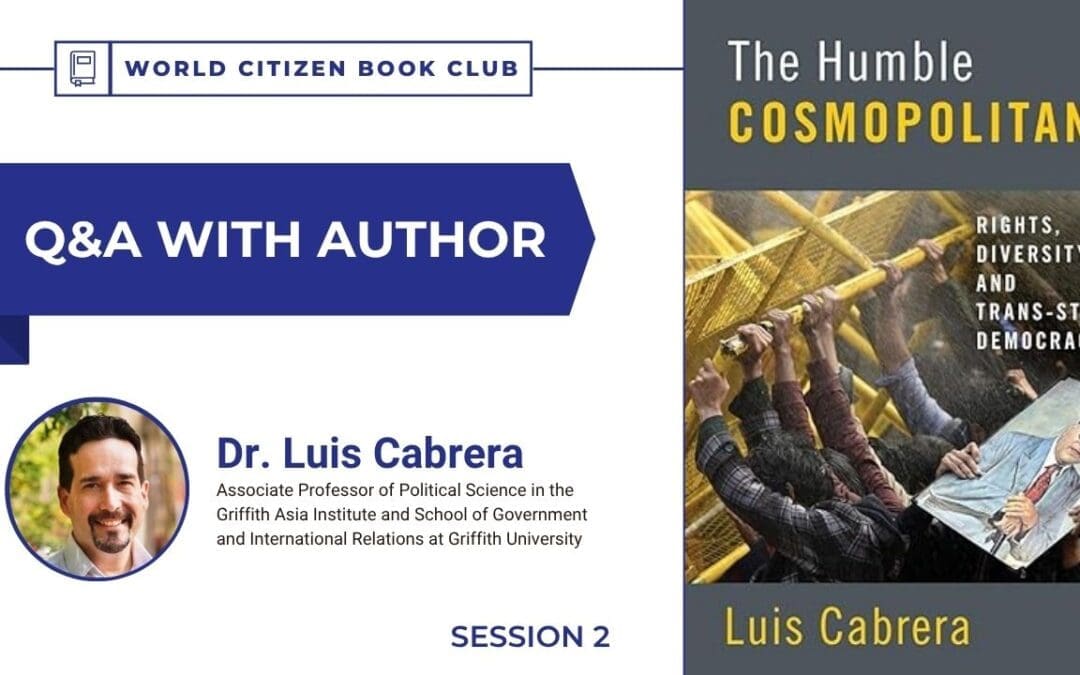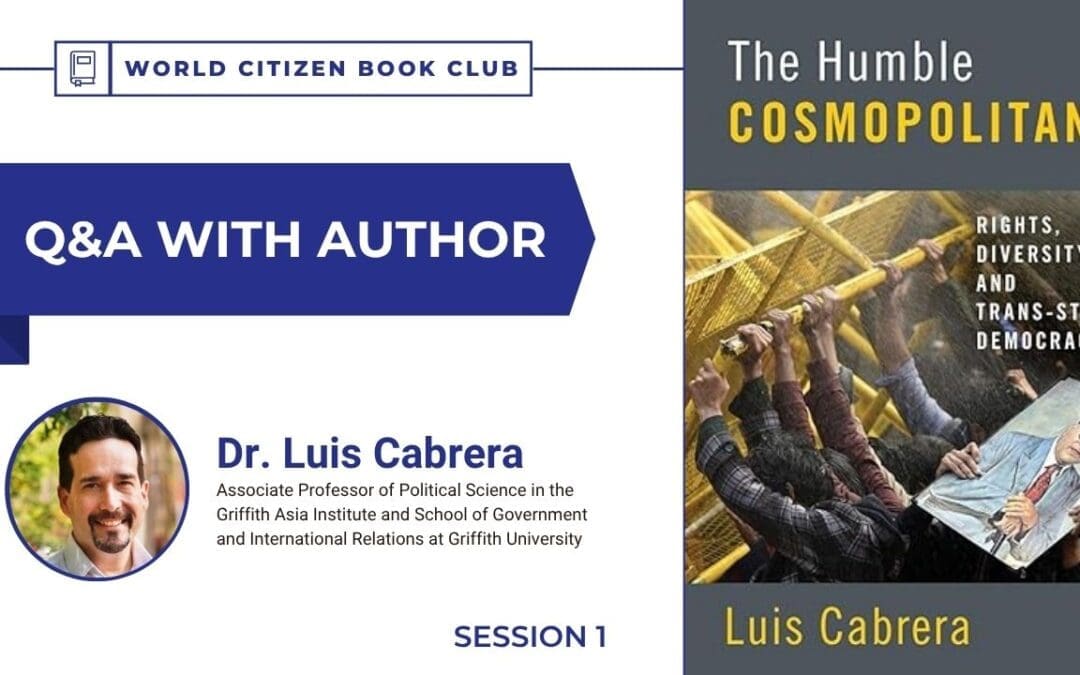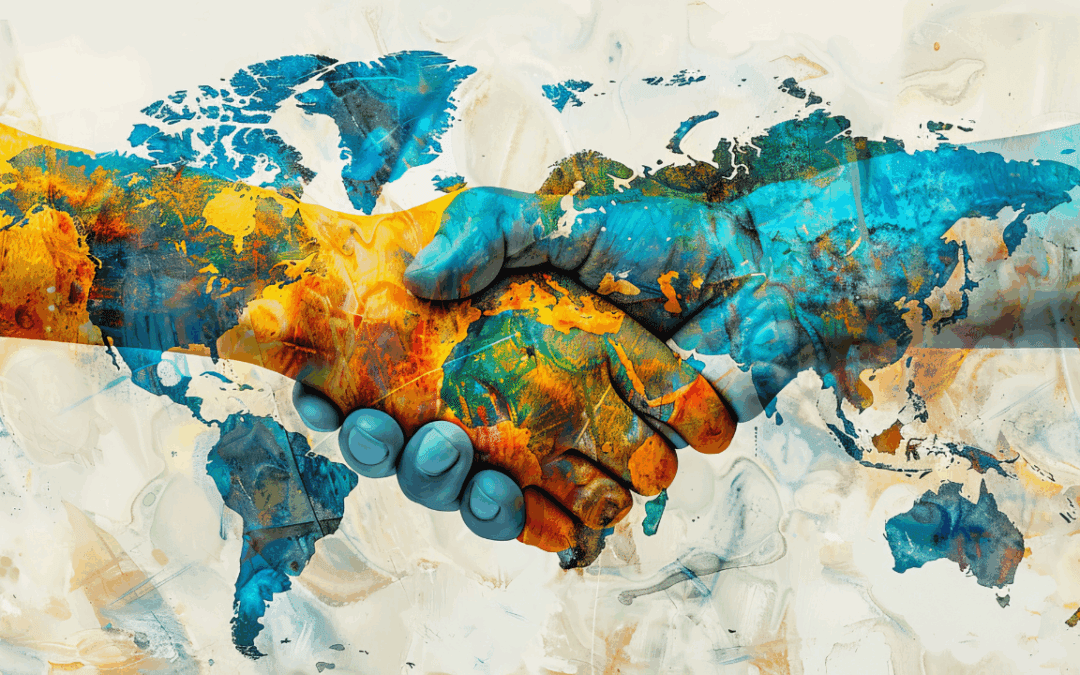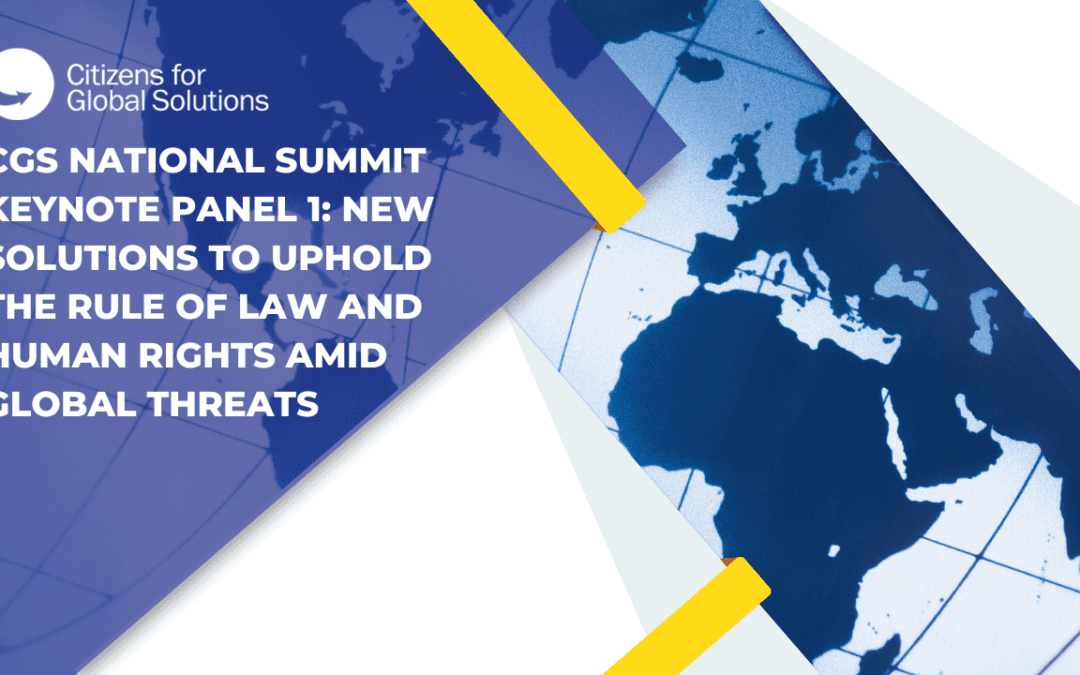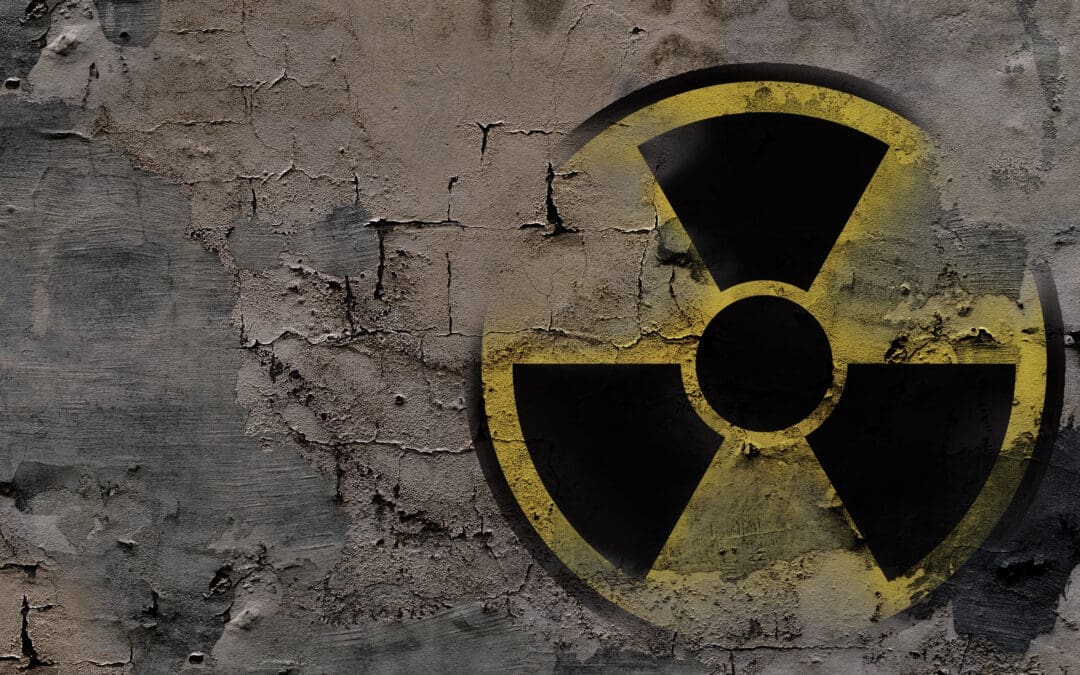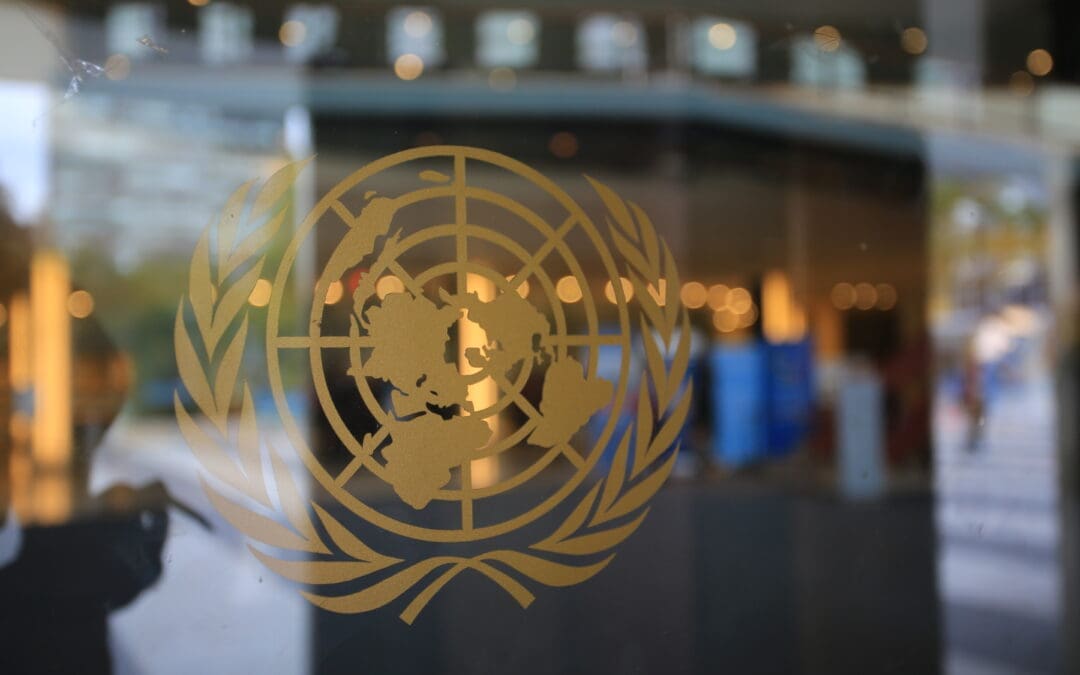
by CGS | Aug 3, 2025 | Past Event
About the Book
The Humble Cosmopolitan explores how an “institutional global citizenship” approach to cosmopolitanism could promote political humility globally. It draws on the work of Indian constitutional architect and social activist B.R. Ambedkar to challenge the notion that sovereign states are empowered to dismiss rights-based challenges from outsiders or their own populations—even as they serve as the designated guarantors of human rights.
About the Author
Luis Cabrera is Associate Professor in the School of Government and International Relations and Griffith Asia Institute at Griffith University in Brisbane, Australia. He has published widely on issues of global justice and ethics, including global citizenship, migration and individual rights, and on the development of more democratically accountable regional and global political institutions. He has conducted related field research in India, Mexico, Southeast Asia, several European Union countries, Turkey, and the United States.

by Lawrence Wittner | Jul 28, 2025 | Global Cooperation
At a time when international cooperation provides the key to preventing a variety of global calamities―including nuclear war, climate catastrophe, and massive starvation―it’s tragic that major nations, ruled by nationalist, rightwing parties, are on a collision course with the organizations that represent the international community.
Chief among these international organizations is the United Nations, with a Charter that bans “the threat or use of force against the territorial integrity or political independence of any state.” Nevertheless, ignoring this ban, the Russian government has engaged since February 2022 in a massive military invasion and occupation of Ukraine, the Israeli government has continued a brutal occupation and military bombardment of Gaza, and the President of the United States has ordered the bombing of Iran and talked glibly of seizing Gaza, Greenland, and the Panama Canal.
These same nations have refused to comply with or stymied the mandates of numerous key international organizations.
The Russian government has refused to abide by the February 2022 ruling of the International Court of Justice that Russia cease its military invasion of Ukraine immediately, has defied repeated votes by the UN General Assembly condemning its invasion, occupation, and annexation of Ukraine, and has rejected compliance with an International Criminal Court arrest warrant for Russian President Vladimir Putin for his regime’s kidnapping of Ukrainian children. In the UN Security Council, Russia used its veto to frustrate international denunciation of its war on Ukraine and condemnation of Russian annexation of Ukrainian territory.
The Israeli government has spurned vast numbers of UN General Assembly resolutions calling for fair treatment of Palestinians and an end to Israeli occupation of their land or to honor the International Criminal Court’s arrest warrant for Prime Minister Benjamin Netanyahu for war crimes against humanity in Gaza.
For its part, the U.S. government, under the new administration of Donald Trump, belittled the United Nations, pulled the United States out of the World Health Organization, abandoned the UN Human Rights Council, suspended U.S. payment for the UN Relief and Works Agency for Palestine Refugees, and announced a review of its membership in the UN Educational, Scientific, and Cultural Organization. It also employed its veto to block passage of a UN Security Council resolution demanding a permanent ceasefire in Gaza.
The fervent resistance of these governments to international authority is illustrated by their vehement responses to the work of the International Criminal Court (ICC), a global juridical entity endorsed by 125 nations. In Russia, the government opened criminal cases against the prosecutor and judges of the court, while former President Dmitry Medvedev publicly threatened to target the court with missile strikes. In Israel, Prime Minister Netanyahu fiercely denounced the ICC warrant for his arrest as an “antisemitic act” by a corrupt prosecutor and biased judges. In the United States, President Trump issued an executive order in early February 2025 imposing economic and travel sanctions against the ICC prosecutor, establishing a framework for imposing additional sanctions on ICC officials, and directing the U.S. officials to submit the names of other individuals to be targeted.
Indeed, the Trump administration has launched an all-out attack on the work of international institutions, especially the United Nations. In February, Trump ordered a six-month review of U.S. membership in all international organizations, conventions, and treaties with a view toward reducing funding, ending funding, or simply withdrawing from them. This review included a critical examination of the United Nations, with the result that the administration’s 2026 budget proposal reduced UN funding by 87 percent. This draconic UN budget cut will drastically undermine the World Food Program, assistance to children (e.g. UNICEF), refugee, migration, disaster relief, family planning, and economic development programs, the International Court of Justice, the International Atomic Energy Agency, and UN peacekeeping missions, with disastrous consequences. Global starvation, for example, is now widespread, with acute hunger confronting 343 million people in 74 nations.
Meanwhile, in Congress, Republican legislators have introduced bills in the Senate and the House to terminate U.S. membership in the United Nations and affiliated institutions. Representative Chip Roy of Texas, a MAGA stalwart, declared that it was time to dissociate the United States from “this corrupt globalist organization.”
Despite these attacks and a retreat from international responsibility by other nations, it remains possible that international organizations can weather the rightwing, nationalist storm. At the United Nations, Secretary-General António Guterres has been working to modernize and streamline the UN system’s structure, priorities, and operations to meet the new challenges it faces. Nevertheless, given the need to reduce the UN core budget by 20 percent, his new UN80 reform plan does call for thousands of job cuts.
A more promising solution to the problems created by nationalist ideologues in major nations is for other nations to pick up the slack in supporting international institutions. The European Union (EU) is particularly well positioned to assume this role, for it generally favors multilateral action to address global challenges. And it also possesses substantial financial resources. Together with Britain and some potential non-Western partners, such as Japan and South Korea, the EU could substitute for the United States in bolstering the United Nations and other organizations that now provide the rudiments of cooperative global governance.
In addition, it’s certainly possible that, given the inability of governments with a narrow nationalist approach to effectively address contemporary global problems, they will sooner or later be replaced by governments better able to cope with the modern world.
Of course, the League of Nations and the hope of international cooperation were destroyed in the 1930s thanks to the rise of rightwing, hyper-nationalist regimes, and a comparable process might be unfolding today.
Even so, with the onset of World War II, most people finally realized that narrow nationalism had to give way to global cooperation. Let’s hope that it won’t take another world war or comparable catastrophe to convince people again.

by Citizens for Global Solutions | Jul 23, 2025 | Past Event
About the Book
The Humble Cosmopolitan explores how an “institutional global citizenship” approach to cosmopolitanism could promote political humility globally. It draws on the work of Indian constitutional architect and social activist B.R. Ambedkar to challenge the notion that sovereign states are empowered to dismiss rights-based challenges from outsiders or their own populations—even as they serve as the designated guarantors of human rights.
About the Author
Luis Cabrera is Associate Professor in the School of Government and International Relations and Griffith Asia Institute at Griffith University in Brisbane, Australia. He has published widely on issues of global justice and ethics, including global citizenship, migration and individual rights, and on the development of more democratically accountable regional and global political institutions. He has conducted related field research in India, Mexico, Southeast Asia, several European Union countries, Turkey, and the United States.

by Allen Pietrobon | Jul 9, 2025 | Global Cooperation
In the aftermath of the U.S. government’s military strikes against Iran’s nuclear facilities, it is easy to assume that Iran and the United States will never come to diplomatic terms over Iran’s nuclear future. President Donald Trump reportedly decided to launch the strikes partly because he had become increasingly frustrated with Iran for not responding to the latest proposal for a nuclear deal.
Iran, for its part, claimed that it would never abandon its right to enrich uranium for domestic purposes. But at least they were still talking. Now, in response to the American military attacks, Iran’s top diplomat has said that the United States had “decided to blow up diplomacy,” and the next scheduled round of nuclear talks was canceled.
The prospect of Iran developing a nuclear weapon is a grave danger that, like other nuclear perils, needs to be taken seriously. But history has shown that even in moments of maximum danger, when the world seems perched on the edge of a wider war, diplomatic solutions are possible.
The parallels to another historical moment are telling. Before the Cuban Missile Crisis in October 1962, the U.S. government had been negotiating with the Soviet government for over six years to get a nuclear test ban treaty signed that would put major constraints on the testing and development of nuclear weapons.
When the Missile Crisis began, Soviet Premier Nikita Khrushchev called U.S. President John F. Kennedy’s announcement of a naval blockade (technically, an act of war) “outright banditry . . . the folly of degenerate imperialism.” He declared that “the Soviet Union cannot fail to reject the arbitrary demands of the United States.”
Similarly, Iranian Foreign Minister Abbas Araghchi has called the attacks on Iran “barbarous” and claimed that the U.S. government had acted in such a way as to make further nuclear talks “meaningless.”
And yet, back in 1962, the U.S. and Soviet Union, despite being just one mistake or miscalculation away from blundering into a global nuclear war, managed to work together to negotiate a diplomatic end to the crisis. Indeed, the year between the Cuban Missile Crisis in October 1962 and the ratification of the Limited Nuclear Test Ban Treaty in October 1963 witnessed one of the most unexpected reversals in international conflict during the entire Cold War.
The first overture came on December 19, 1962, when Khrushchev, breaking with years of hardline diplomacy, dispatched a letter to Kennedy offering to move forward with a treaty to ban the testing of nuclear weapons. It was the first direct contact between the two leaders in nearly two months.
Hoping to capitalize on this positive diplomatic opening, Kennedy chose an unorthodox route. Instead of turning to his professional diplomats, bound by protocol and official talking points, he chose to dispatch a private citizen, the prominent journalist Norman Cousins, editor of the Saturday Review, to personally meet with Khrushchev and help clear up the remaining obstacles to a settlement.
During this meeting, Khrushchev explained to Cousins that he was encountering fierce opposition from within his own government in his pursuit of the test ban and that what he needed from Kennedy was a sign that the U.S. government was serious about negotiating in good faith.
Back in the United States, Cousins convinced Kennedy that the moment was at hand for the most important single speech of his presidency — a speech in which, after years of tension, he should take the leap to extend an olive branch to the Soviets.
This speech, delivered on June 10, 1963, at the American University commencement, asked Americans to re-examine their negative attitudes towards the Soviet Union and toward peace in general. “Too many of us think [peace] is impossible,” Kennedy said. “But that is a dangerous, defeatist belief. It leads to the conclusion that war is inevitable.”
He urged Americans to “focus instead on a more practical, more attainable peace,” rather than on a “grand or magic formula to be adopted by one or two powers.” He asked the American people “not to see only a distorted and desperate view of the other side, not to see conflict as inevitable, accommodation as impossible, and communication as nothing more than an exchange of threats.”
Although this American University address is now regarded as one of Kennedy’s most famous speeches, at the time his critics attacked this peaceful diplomatic overture to the Soviet Union as “a soft line that will accomplish nothing” and “a dreadful mistake.” Kennedy could have bowed to the pressure of these critics, but instead he chose to break from the aggressive and intransigent rhetoric of the past and redefine the debate.
The speech provided the show of good faith that Khrushchev was waiting for. As a result, despite years of political deadlock, a treaty to ban the atmospheric testing of nuclear weapons was signed between the two nations less than two months later.
Today, we find ourselves at a similar impasse, opening the door to a wider military confrontation. Military strikes against Iran’s nuclear facilities have done nothing more than buy some time. The question is, what do we do with that time? If unilateral military attacks are going to erupt every time a government leader thinks an unfriendly country is developing nuclear weapons, we are entering a very dangerous future, indeed.
Fortunately, history has shown us that, in a moment defined by the overwhelming tensions that nuclear weapons create, sometimes the most powerful weapon of all is the strength of international dialogue and agreement.

by Lawrence Wittner | May 22, 2025 | Disarmament
Although the statement that “power grows out of the barrel of a gun” was made by Chinese communist leader Mao Zedong, it’s an idea that, in one form or another, has motivated a great many people, from the members of teenage street gangs to the statesmen of major nations.
The rising spiral of world military spending provides a striking example of how highly national governments value armed forces. In 2024, the nations of the world spent a record $2.72 trillion on expanding their vast military strength, an increase of 9.4 percent from the previous year. It was the tenth year of consecutive spending increases and the steepest annual rise in military expenditures since the end of the Cold War.
This enormous investment in military might is hardly a new phenomenon. Over the broad sweep of human history, nations have armed themselves―often at great cost―in preparation for war. And an endless stream of wars has followed, resulting in the deaths of perhaps a billion people, most of them civilians. During the 20th century alone, war’s human death toll numbered 231 million.
Even larger numbers of people have been injured in these wars, including many who have been crippled, blinded, hideously burned, or driven mad. In fact, the number of people who have been wounded in war is at least twice the number killed and has sometimes soared to 13 times that number.
War has produced other calamities, as well. The Russian military invasion of Ukraine, for example, has led to the displacement of a third of that nation’s population. In addition, war has caused immense material damage. Entire cities and, sometimes, nations have been reduced to rubble, while even victorious countries sometimes found themselves bankrupted by war’s immense financial costs. Often, wars have brought long-lasting environmental damage, leading to birth defects and other severe health consequences, as the people of Hiroshima, Nagasaki, Vietnam, and the Middle East can attest.
Even when national military forces were not engaged in waging foreign wars, they often produced very undesirable results. The annals of history are filled with incidents of military officers who have used their armies to stage coups and establish brutal dictatorships in their own countries. Furthermore, the possession of military might has often emboldened national leaders to intimidate weaker nations or to embark upon imperial conquest. It’s no accident that nations with the most powerful military forces (“the great powers”) are particularly prone to war-making.
Moreover, prioritizing the military has deprived other sectors of society of substantial resources. Money that could have gone into programs for education, healthcare, food stamps, and other social programs has been channeled instead into unprecedented levels of spending to enhance military might.
It’s a sorry record for what passes as world civilization―one that will surely grow far worse, or perhaps terminate human existence, with the onset of a nuclear war.
Of course, advocates of military power argue that, in a dangerous world, there is a necessity for deterring a military attack upon their nations. And that is surely a valid concern.
But does military might really meet the need for national security? In addition to the problems spawned by massive military forces, it’s not clear that these forces are doing a good job of deterring foreign attack. After all, every year government officials say that their countries are facing greater danger than ever before. And they are right about this. The world is becoming a more dangerous place. A major reason is that the military might sought by one nation for its national security is regarded by other nations as endangering their national security. The result is an arms race and, frequently, war.
Fortunately, though, there are alternatives to the endless process of military buildups and wars.
The most promising among them is the establishment of international security. This could be accomplished through the development of international treaties and the strengthening of international institutions.
Treaties, of course, can establish rules for international behavior by nations while, at the same time, resolving key problems among them (for example, the location of national boundaries) and setting policies that are of benefit to all (for example, reducing greenhouse gases in the atmosphere). Through arms control and disarmament agreements they can also address military dangers. For example, in place of the arms race, they could sponsor a peace race, in which each nation would reduce its military spending by 10 per cent per year. Or nations could sign and ratify (as many have already done) the Treaty on the Prohibition of Nuclear Weapons, which would end the menace of nuclear annihilation.
International institutions can also play a significant role in reducing international conflict and, thus, the resort to military action. The United Nations, established in 1945, is tasked with maintaining international peace and security, while the International Court of Justice was established to settle legal disputes among nations and the International Criminal Court to investigate and, where justified, try individuals for genocide, war crimes, crimes against humanity, and the crime of aggression.
Unfortunately, these international organizations are not fully able to accomplish their important tasks―largely because many nations prefer to rely upon their own military might and because some nations (particularly the United States, Russia, and Israel) are enraged that these organizations have criticized their conduct in world affairs. Even so, international organizations have enormous potential and, if strengthened, could play a vital role in creating a less violent world.
Rather than continuing to pour the wealth of nations into the failing system of national military power, how about bolstering these global instruments for attaining international security and peace?

by Citizens for Global Solutions | May 16, 2025 | Past Event
During this high-level, live-streamed public panel at the 2025 National Summit, Citizens for Global Solutions (CGS) partners came together to highlight their efforts in driving action during turbulent times. They showcased innovative approaches to addressing escalating global threats and shared how their collaboration with CGS strengthens these initiatives. The panel also offered valuable insights into the evolving landscape of global governance—exploring both the pressing challenges and emerging opportunities ahead.
Moderator: Alyn Ware, Program Director, WFM-IGP; Co-Founder, Legal Alternatives to War (LAW not War)
Speakers:
- Yasmina Gourchane, Advocacy Officer, Coalition for the International Criminal Court (CICC)
- Tess Graham, Legal Advisor, Global Justice Center
- Saul Kenny, Communication Advisor at the UN Charter Reform Coalition
- Alexandre MacIsaac, Executive Director, WFM-Canada
- Dan Perell, Representative to the United Nations, Baha’i International Community
- Karam Singh, Deputy Director, Integrity Initiatives International (III)

by Lawrence Wittner | Apr 7, 2025 | Disarmament
Amid growing international chaos, it should come as no surprise that nuclear dangers are increasing.
The latest indication is a rising interest among U.S. allies in enhancing their nuclear weapons capability. For many decades, remarkably few of them had been willing to build nuclear weapons―a result of popular opposition to nuclear weapons and nuclear war, progress on nuclear arms control and disarmament, and a belief that they remained secure under the U.S. nuclear umbrella. But, as revealed by a recent article in London’s Financial Times, Donald Trump’s public scorn for NATO allies and embrace of Vladimir Putin have raised fears of U.S. unreliability, thereby tipping the balance toward developing an expanded nuclear weapons capability.
This growing interest in nuclear weapons is especially noticeable in Europe, where Trump’s berating of NATO and Putin’s threats of nuclear attack are particularly unsettling. Although Friedrich Merz, Germany’s chancellor-in-waiting, dismissed any notion of Germany developing its own nuclear weapons, he has stated that it must explore “whether nuclear sharing, or at least nuclear security from the U.K. and France, could also apply to us.” Furthermore, several German think tank experts have floated the idea of building the infrastructure that, if necessary, could produce German nuclear weapons.
In Poland, too, a nuclear weapons capacity has become increasingly appealing. Prime Minister Donald Tusk has recently raised the idea of pursuing nuclear weapons or, at least, seeking an agreement for sharing France’s nuclear arsenal. A board director of PGZ, Poland’s state-controlled military manufacturer, remarked: “There are suddenly a lot of words and different opinions about what to do, but they all show Poland believes in stronger nuclear deterrence against Russia.”
In South Korea, North Korea’s nuclear weapons program and its growing military relationship with Russia, combined with Trump’s unreliability, have contributed to growing support for the nation’s acquiring its own nuclear weapons. Although neither of the two major parties has announced this policy, Cho Tae-yul, the foreign minister, informed parliament that acquiring nuclear weapons was “not off the table,” for “we must prepare for all scenarios.”
Similarly, the idea of developing nuclear weapons is drawing increasing scrutiny in Japan. Sharing South Korea’s fear of a North Korean attack and Trump’s unreliability, Japanese leaders also worry about China’s growing assertiveness. If a North Korean or Chinese nuclear strike occurred, Japan would have only five minutes of warning time. Moreover, thanks to its nuclear power plants, Japan already holds enough plutonium to build several thousand nuclear bombs.
In addition, of course, a nuclear arms race is well underway among the nuclear weapons-producing nations: the United States, Russia, China, Britain, France, Israel, India, Pakistan, and North Korea. All of them are either expanding their nuclear arsenals, building a new generation of nuclear weapons, or both. Most of the nuclear arms control and disarmament agreements of the past have been abandoned, while the remaining agreements are on life support. The New Start Treaty between Russia and the United States, the two nations possessing almost 90% of the world’s 12,331 nuclear weapons, is scheduled to expire in February 2026, and there are no negotiations underway to replace it. Meanwhile, in recent years, the top officials of three nuclear-armed nations―Vladimir Putin, Donald Trump, and Kim Jong Un―have issued numerous statements threatening nuclear war.
Against this backdrop, this January the editors of the Bulletin of the Atomic Scientists reset their “Doomsday Clock,” established in 1946, at 89 seconds to midnight, the closest ever to human extinction. The following month, U.N. Secretary-General António Guterres, deploring the unraveling of international security arrangements, warned that nuclear weapons provided a “one-way road to annihilation.”
These escalating nuclear dangers suggest that, if nuclear weapons, whether possessed by an alliance or by individual nations, are unable to safeguard humanity from total destruction, then a different approach to survival in the nuclear age is needed: one grounded in international security.
With this in mind, the official representatives of most of the world’s nations, gathering in 2017 under U.N. auspices, met and crafted the Treaty on the Prohibition of Nuclear Weapons. Endorsed by a vote of 122 to 1 (with one abstention), it banned the use, threatened use, development, manufacture, acquisition, possession, stockpiling, stationing, and installation of nuclear weapons. The treaty entered into force in January 2021, and has been signed, thus far, by 94 nations. Opinion polls and declarations by hundreds of cities in a variety of nations indicate that it has substantial public support.
Although the Treaty on the Prohibition of Nuclear Weapons provides a useful framework for creating a nuclear weapons-free world, it has not, as yet, rolled back the nuclear menace. The reason is that its provisions are only binding on the nations that have signed it. And the nine nuclear weapons-producing nations, joined by the nations under their nuclear umbrella, refuse to do so―at least so far. Convinced that, in a world of independent and often hostile nations, their security rests upon possession of nuclear weapons, they remain unwilling to abolish them.
Even so, their resistance to the treaty might be overcome by a further step toward international security: the strengthening of international organizations. At present, the United Nations lacks the power to effectively enforce its primary mission of maintaining international peace and security. But that power could be expanded by providing the global organization with an independent source of income, restricting the role of the veto in the Security Council, and expanding the role of the General Assembly. International security would also be enhanced by increasing the jurisdiction of the International Court of Justice and of the International Criminal Court.
Both Citizens for Global Solutions (CGS) and the World Federalist Movement-Institute for Global Policy have teamed up with many other concerned civil society organizations to champion “Common Security” as an alternative to nuclear deterrence. In a joint statement to the 2023 Preparatory Committee for the 11th Non-Proliferation Treaty (NPT) Review Conference, they argued that the primary reason a significant number of nations continued to rely on nuclear weapons was “because nuclear deterrence is perceived by them as providing security.” But adopting a Common Security approach―one that took into account not only one’s own security needs, but the security needs of other nations, including adversaries―could provide a sound basis for abandoning nuclear weapons, they maintained. During the meeting in late April and early May of the 2025 Preparatory Committee for the NPT Review Conference, CGS will be holding a side event on “Common Security and Nuclear Deterrence in a Turbulent World,” as well as another on “The International Court of Justice and the Climate-Nuclear Nexus.”
Strengthening international security might seem impractical at this time of overheated nationalist claims and the global chaos they produce. Even so, times of crisis sometimes produce historic breakthroughs, and the prospect of nuclear annihilation might have that effect.

by Citizens for Global Solutions | Apr 3, 2025 | United Nations
Sixteen years after the fateful day the United Nations (U.N.) charter was promulgated in San Francisco, President John F. Kennedy memorably intoned on a return to that city that the U.N. “remains mankind’s best hope to conquer war, poverty, and disease.” Across subsequent decades this aspiration has been shared by U.S. presidents from Reagan, who believed that U.N. could help “bring about a new day,” to George H.W. Bush, who recognized the U.N. system as “poised to historic vision of its founders—a world in which nations recognize the shared responsibility for freedom and justice.” Today, the U.S. posture seems to reduce the U.N. and its various agencies and departments to poker chips or lots at auction.
The late President Carter emphasized that “[t]he United Nations is the best available institution to support the values and aspirations that the United States shares with other peace-loving nations.” Of course, “best available” does not mean unflawed. The U.N. is a human-made institution and, therefore, fallible. It is incumbent on all those who support effective global governance, human rights, and the rule of law to underscore areas for improvement, while adapting to new polycrises and fresh challenges.
None of this is easy. But, as the leader of an organization that has supported the U.N. project almost since its inception, I am proud that our members have championed reform efforts while hewing to the vision that guided the U.N.’s founding.
What is easier is to reduce the U.N. to a stock to be traded, a poker chip to be gambled, or a lot to be auctioned to the highest bidder. The current U.S. administration uses its time in the General Assembly Hall to disavow goals related to sustainable development, withdraw from human rights commitments, and oppose such basic principles as “peaceful cooperation” and “judicial well-being.” Alarmingly, pundits have jumped on the bandwagon to reduce the project of humankind to a bad real estate deal.
This year, the U.N. will commemorate its 80th anniversary—slightly ahead of the average U.S. life expectancy projected for 2025 of 79.4 years. Anyone who has visited the Geneva premises lately, where an ongoing liquidity crisis has occasioned desperate measures, like heating cuts, has reason to fear for this octogenarian’s health.
Perhaps the venal attitude is best typified by an opportunistic “independent, non-affiliated initiative,” DOGE-UN, which claims to be a “non-profit organization incorporated in New York State.” According to its website, “It analyzes each institution and the broader geopolitical marketplace on whether to ‘hold, buy or sell’ their stakes in international organizations.” The outfit is indeed incorporated in New York as a business. It is not listed on the New York State Attorney General’s Office public registry of charitable and non-profit organizations. Research indicates it is not affiliated with the federal Department of Government Efficiency (DOGE).
Whatever the tax status of this start-up, the approach it advances of “hold, buy, or sell” fails to recognize that global cooperation is not a zero-sum game. Viruses do not carry passports. Climate disasters do not wait behind velvet ropes. Nuclear reactors are not impressed by border demarcations.
Finally, if altruism fails to inspire global cooperation, perhaps self-interest can. “America first” style critics of the U.N. frequently fail to note that the United States is the largest recipient of U.N. contracts – far outstripping our dues. In the words of Peter Yeo, President of the Better World Campaign, “U.S. companies do well and do good by taking part in the U.N.’s lifesaving work.”
On the U.N.’s Oak anniversary, we must not take its strength and endurance for granted. Please consider making your voice heard by contacting your legislators and urging support for the U.N. and its agencies.
As you do, you may remind them that what transpired in San Francisco 80 years ago was not a poker game but a promise to humankind and our planet.

by CGS | Mar 29, 2025 | Past Event
Watch the first of two sessions in CGS’s World Citizen Book Club to discuss World Parliament: Governance and Democracy in the 21st Century (2nd edition) by Andreas Bummel and Jo Leinen.
For the first time, humanity is united in a global civilization facing shared challenges like war, poverty, climate change, and inequality—problems that surpass the capacity of current national and international systems. Despite setbacks from autocracy and nationalism, the global push for freedom continues. A third democratic transformation—toward global democracy—is needed. Central to this vision is the creation of a democratic world parliament. This book examines the idea’s history, relevance, and path to realization. The second edition includes major updates, reflecting recent global events and expanding the original content by about 20 percent.
About the Authors
Andreas Bummel is co-founder and director of Democracy Without Borders and of the Campaign for a United Nations Parliamentary Assembly. He has dedicated his career to the promotion of global democracy and world federalism. From 1998 to 2018 he was a Council member of the World Federalist Movement, an international NGO that promotes the rule of law, world peace, and federalism. He was trained in business administration, studied law and worked at a management consultancy firm. He was born in Cape Town, South Africa, in 1976.
Jo Leinen served as a member of the European Parliament from 1999 to 2019. He chaired the environmental committee and the committee on constitutional affairs. From 2011 to 2017 he was president of the European Movement, an organization advocating for a democratic and enlarged European Union. From 1997 to 2005 he was presiding the Union of European Federalists that is dedicated to the promotion of European political unity. From 1985 to 1994 he was minister of the environment in the German state of Saarland. He graduated in law and was born in Bisten, Germany, in 1948.

by Lawrence Wittner | Mar 26, 2025 | Global Justice, Peace
Although the nations of the world have pledged to respect a system of international law and global responsibility, the recent behavior of several countries provides a sharp challenge to this arrangement.
For over three years, the Russian government has conducted a brutal military invasion, occupation, and annexation of Ukraine―the largest and most devastating military operation in Europe since World War II. Defying Russia’s international obligations―including a peace treaty it signed with Ukraine, a ruling by the International Court of Justice demanding Russia halt its military operations in Ukraine, the UN Charter, and repeated UN General Assembly condemnations of Russian behavior by an overwhelming majority of the world’s nations―the Putin regime has stubbornly persisted with Russia’s imperialist aggression against its smaller, weaker neighbor.
The consequences have been horrific. Russian and Ukrainian military forces are estimated to have suffered a total of roughly a million deaths or injuries. Moreover, the war has taken a severe toll on Ukraine’s civilian population, with some 42,000 civilians killed or injured and over 10 million more fleeing the country or internally displaced. In July 2024, it was estimated that, thanks to the Russian military’s indiscriminate bombing and shelling of civilian infrastructure, Russia had damaged more than 1,600 Ukrainian medical centers and destroyed over 200 hospitals. In the first year-and-a-half of the war, Human Rights Watch reported, the Russian invasion “devastated schools and kindergartens throughout the country,” with “over 3,790 educational facilities . . . damaged or destroyed.” A more recent study by this leading human rights organization noted that, in areas of Ukraine that Russian forces occupy, they have “committed war crimes and crimes against humanity. These include torture and killings of civilians, sexual violence, enforced disappearances, and forcible transfers and unlawful deportations of Ukrainians” to Russia.
For its part, the Israeli government has long been at odds with the United Nations over Israel’s mistreatment of Palestinians and, particularly, its refusal to end its military occupation of the Palestinian territory it conquered during the 1967 Mideast war. Committed to building a Greater Israel, rightwing Israeli government officials have seized Palestinian land in the occupied West Bank and flooded it with about 700,000 heavily-subsidized Israeli settlers. In turn, the UN General Assembly, by an overwhelming vote, has called upon Israel to comply with international law and withdraw its military forces, cease new settlement activity, and evacuate its settlers from the West Bank.
The simmering Israeli-Palestinian conflict erupted once again in October 2023, when, in response to an Hamas terrorist attack, Benyamin Netanyahu, Israel’s prime minister, launched a full-scale military invasion of Gaza with a colossal humanitarian impact. An estimated 46,788 Palestinians have been killed, most of them civilians, and 110,453 have been injured. According to the United Nations, 1.9 million people (90 percent of the population) have been internally displaced thanks to the Israeli bombing campaign, 69 percent of all structures have been destroyed (including 50 percent of hospitals, with the rest just partially functional), and about 1,060 medical workers have been killed. Thanks to the Israeli government’s blockade of food and water supplies, an estimated 91 percent of the population have faced severe levels of hunger.
Although only recently restored to the White House, Donald Trump has already embarked on an ambitious program of scrapping U.S. international commitments and proceeding, instead, with U.S. empire-building. Ordering U.S. sanctions on the International Criminal Court, as well as a U.S. pullout from two key UN agencies (the World Health Organization and the Human Rights Council), he has also chosen a U.S. ambassador to the UN, Representative Elise Stefanik, who has promised to bring the world organization into line with Trump’s “America First” priorities. Moreover, the American president has abruptly terminated nearly all USAID programs, putting millions of people around the world at risk of starvation, disease, and death. In sharp contrast to the severe cuts in domestic social spending that Trump is implementing, he has called for increased military spending, potentially raising the annual U.S. military expenditure from $842 billion to over $1 trillion. This enhanced military power should prove useful, for since returning to office he has championed seizing the Panama Canal and Greenland, taking over Gaza, and annexing Canada as the 51st American state.
In all three cases, the reckless pursuit of narrowly-defined national interests has taken precedence over the shared interests of the world community.
Nor is this an accident, for Putin, Netanyahu, and Trump are caught up in overheated nationalist dreams quite out of touch with global reality. Today, as human survival is threatened by climate catastrophe, a renewed nuclear arms race, disease pandemics, and widespread poverty―crises that cry out for global solutions―these government officials and their rightwing counterparts in other lands are driven by nationalist fantasies. Putin is enamored with Russian imperial glory, Netanyahu is obsessed with visions of Greater Israel, and Trump is intoxicated with America First. And, in their respective fantasies, each of them takes on heroic stature as the Supreme Leader.
Unfortunately, we have seen this phenomenon, along with its catastrophic consequences, many times before.
Fortunately, however, multitudes of people realize that things need not be this way. Indeed, Putin, Netanyahu, and Trump are out of line with the views of many national leaders and social movements that have recognized, and continue to recognize, that the reckless pursuit of narrow national interests is a recipe for disaster. To avoid this disaster, our far-sighted predecessors created the United Nations, the International Court of Justice, the International Criminal Court, and other international institutions. That is also why these institutions must be strengthened, for without the enforcement of world law, national irresponsibility will thrive.
Indeed, if humanity is to survive in coming decades, it is imperative that reckless competition and conflict among nations give way to cooperation and collective action. War must be replaced by peace, privilege by equality, and the rule of force with the force of law.
Above all, no nation can go it alone, for we are all part of one world and must act accordingly.
